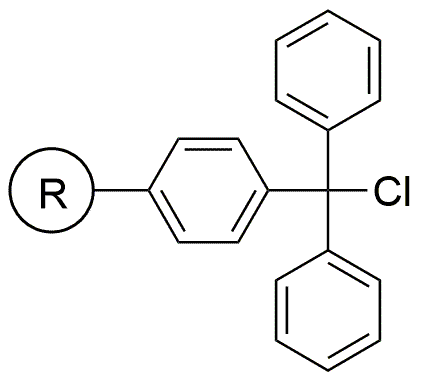Trityl chloride resin (0.4 - 1.0 mmol/g, 200 - 400 mesh) is widely utilized in research focused on:
- Solid-Phase Synthesis: This resin serves as a support for solid-phase peptide synthesis, allowing for the efficient assembly of peptides while simplifying purification processes.
- Protecting Group Applications: It is commonly used for the temporary protection of functional groups in organic synthesis, enhancing the selectivity and yield of reactions.
- Drug Development: In medicinal chemistry, it aids in the synthesis of complex molecules, facilitating the development of new pharmaceuticals with improved efficacy.
- Polymer Chemistry: The resin can be employed in the preparation of functionalized polymers, contributing to advancements in materials science and nanotechnology.
- Analytical Chemistry: It is utilized in the preparation of samples for chromatographic analysis, improving the accuracy and reliability of analytical results.
General Information
Properties
Safety and Regulations
Applications
Trityl chloride resin (0.4 - 1.0 mmol/g, 200 - 400 mesh) is widely utilized in research focused on:
- Solid-Phase Synthesis: This resin serves as a support for solid-phase peptide synthesis, allowing for the efficient assembly of peptides while simplifying purification processes.
- Protecting Group Applications: It is commonly used for the temporary protection of functional groups in organic synthesis, enhancing the selectivity and yield of reactions.
- Drug Development: In medicinal chemistry, it aids in the synthesis of complex molecules, facilitating the development of new pharmaceuticals with improved efficacy.
- Polymer Chemistry: The resin can be employed in the preparation of functionalized polymers, contributing to advancements in materials science and nanotechnology.
- Analytical Chemistry: It is utilized in the preparation of samples for chromatographic analysis, improving the accuracy and reliability of analytical results.
Documents
Safety Data Sheets (SDS)
The SDS provides comprehensive safety information on handling, storage, and disposal of the product.
Product Specification (PS)
The PS provides a comprehensive breakdown of the product’s properties, including chemical composition, physical state, purity, and storage requirements. It also details acceptable quality ranges and the product's intended applications.
Certificates of Analysis (COA)
Search for Certificates of Analysis (COA) by entering the products Lot Number. Lot and Batch Numbers can be found on a product’s label following the words ‘Lot’ or ‘Batch’.
Numéro de catalogue
Numéro de lot/série
Certificates Of Origin (COO)
This COO confirms the country where the product was manufactured, and also details the materials and components used in it and whether it is derived from natural, synthetic, or other specific sources. This certificate may be required for customs, trade, and regulatory compliance.
Numéro de catalogue
Numéro de lot/série
Safety Data Sheets (SDS)
The SDS provides comprehensive safety information on handling, storage, and disposal of the product.
DownloadProduct Specification (PS)
The PS provides a comprehensive breakdown of the product’s properties, including chemical composition, physical state, purity, and storage requirements. It also details acceptable quality ranges and the product's intended applications.
DownloadCertificates of Analysis (COA)
Search for Certificates of Analysis (COA) by entering the products Lot Number. Lot and Batch Numbers can be found on a product’s label following the words ‘Lot’ or ‘Batch’.
Numéro de catalogue
Numéro de lot/série
Certificates Of Origin (COO)
This COO confirms the country where the product was manufactured, and also details the materials and components used in it and whether it is derived from natural, synthetic, or other specific sources. This certificate may be required for customs, trade, and regulatory compliance.


